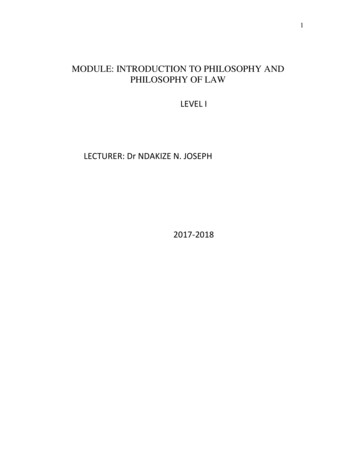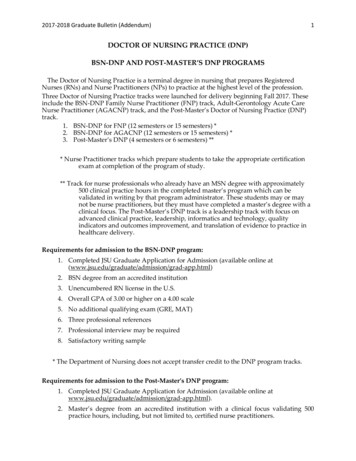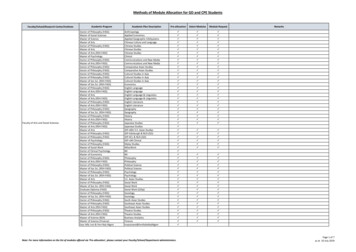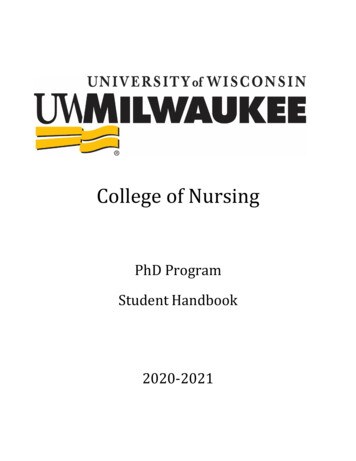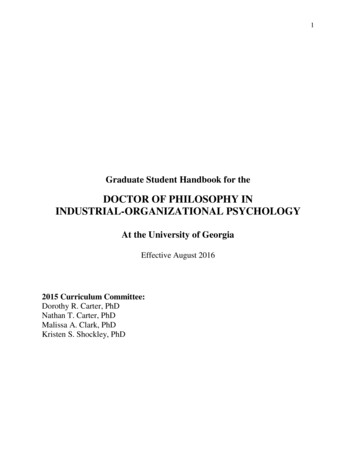
Transcription
1Graduate Student Handbook for theDOCTOR OF PHILOSOPHY ININDUSTRIAL-ORGANIZATIONAL PSYCHOLOGYAt the University of GeorgiaEffective August 20162015 Curriculum Committee:Dorothy R. Carter, PhDNathan T. Carter, PhDMalissa A. Clark, PhDKristen S. Shockley, PhD
2TABLE OF CONTENTS:Overview and Application . .3Required Coursework for the M.S. Degree . .3Requirements Beyond the M.S. Degree . .5Annual Evaluative Reviews . . .9Comprehensive Examinations .10Appendix A: Annual Student Evaluation Form 14Appendix B: Preliminary Comprehensive Examination Form 24
3Overview and ApplicationThe following requirements apply to all students admitted to the doctoral program in Fall 2016and later. For students admitted in Fall 2015 and earlier, the student and advisor must decidewhether they will follow the current requirements or the previous set of requirements.Since the M.S. degree at the University of Georgia represents an effort to acquaint each studentwith the basics of Psychology, admitted students with Master's degrees in Psychology from otherinstitutions may be required to make up deficiencies by enrolling in appropriate M.S. corecourses (described below). Students with graduate course work or with a Master's degree withouta Master's thesis may petition to exempt specific courses. A uniform screening procedure hasbeen established in the Department of Psychology by which a student may challenge specificM.S. core courses. Information on this procedure is available from the Psychology Department'sGraduate Coordinator.Required Coursework for the M.S. Degree (32 Hours):All candidates for the M.S. degree must complete a minimum of 32 hours of course work withgrades of at least B-.These hours include required core courses and a minimum of three hours of thesis research.(Students exempting one or more core courses must still complete at least 30 hours of graduatelevel course work). The required Master's core courses are as follows:Group A (2 required): PSYC 6180 History of Psychology (3 hours)PSYC 6110 Learning Processes (3 hours)PSYC 6100 Cognitive Psychology (3 hours)PSYC 6130 Biological Foundations of Behavior (3 hours)PSYC 6160 Sensory Psychology (3 hours)PSYC 6510 Theories of Personality (3 hours)PSYC 6200 Advanced Social Psychology (3 hours)PSYC 6220 Developmental Psychology (3 hours)PSYC 6500 Psychology of Prejudice (3 hours)Group B (all required): PSYC 6310 Introduction to Industrial Psychology (3 hours)PSYC 6320 Introduction to Organizational Psychology (3 hours)PSYC 6420 Quantitative Methods (3 hours)PSYC 6430 Applied Regression Methods in Psychology (3 hours)PSYC 6250 Psychometrics (3 hours)PSYC 6XXX Ethics and Professional Issues (3 hours)
4 *PSYC 7000 Master’s Research (4 hours min)*PSYC 7300 Master's Thesis Research (3 hours min)*All incoming students, except those admitted with a Master's degree including a thesis, musttake four credit hours total, two per semester, of PSYC 7000M during their first two semesters inresidence. The purpose will be to prepare the student for thesis research. Then students mustenroll in three credit hours of PSYC 7300 after proposing the master’s thesis. In addition to thesecourses, all entering students are required to take GRSC 7770 for two credit hours. This credit,however, does not apply to the total number of credits taken when submitting your Master’sprogram of study to the graduate school.Requirements Beyond the M.S. Degree:In addition to the 32 hours of course work required for the M.S. degree, doctoral programs ofstudy in the Industrial-Organizational Psychology Program must include at least 18 hours inIndustrial-Organizational Psychology, 6 hours in an area approved by the doctoral advisorycommittee (this may be outside of Industrial-Organizational Psychology) and 3 hours of PSYC9300 (doctoral dissertation) beyond the M.S. degree. A student's doctoral program of study willbe constructed with, and approved by, his/her major professor and doctoral committee.Two specialty areas are offered in the Industrial-Organizational Psychology Program: IndustrialOrganizational Psychology and Measurement.In addition to course work within the specialty area chosen by the student to be his/her area ofprimary concentration, the student's program of study must include a minimum of 6 hours withinanother Specialty Area approved by the doctoral advisory committee. The student, inconsultation with the major professor and doctoral committee, will select the remainingunspecified course hours.Note that any course that is included in a student's M.S. program of study cannot be included inthat student's doctoral program of study. Per department policy, only courses in which grades ofat least B- were received can be included in either program of study.The course requirements are specified below with indicated credit hours being minimal.I. Industrial-Organizational Psychology Courses (18 hours required) Industrial-Organizational Psychologyo *PSYC 8260 Applied Cognitiono *PSYC 9880 Seminar in Staffingo *PSYC 8980 Seminars in Industrial-Organizational Psychology including but notlimited to: Diversity in Organizations Leadership in Organizations Organizational Effectiveness and Change Organizational Theory and Design
5 Performance Appraisal Personnel Selection Training and Career Development Advanced Industrial Psychologyo *PSYC9100: Special Problems (maximum 3 hours) NOTE: The student is allowed to replace ONLY ONE COURSE withPSYC 9100 across ALL groups of courses (i.e., the student and advisormust determine whether to use the 9100 option in EITHER the IO/Measurement/Individual Differences OR the Outside Specialty courses)*PSYC 6310 (or its equivalent) is prerequisite to these courses unless otherwiseapproved by the advisor and program chair. Measurement and Individual Differenceso *PSYC 6210 Individual Differenceso *PSYC 8930 Advanced Psychological Measuremento *PSYC 8940 Cognitive Measuremento *PSYC 8990 Seminar in Psychometrics including but not limited to: Multilevel & Mixed Modeling Latent Variable Models (Confirmatory Analysis/Item Response Theory) Hierarchical Linear Modeling Meta-Analysis Validityo *PSYC9100: Special Problems (maximum 3 hours) NOTE: The student is allowed to replace ONLY ONE COURSE withPSYC 9100 across ALL groups of courses (i.e., the student and advisormust determine whether to use the 9100 option in EITHER the IO/Measurement/Individual Differences OR the Outside Specialtycourses). There is no requirement to use this option.*PSYC 6310 (or its equivalent) is prerequisite to these courses unlessotherwise approved by the advisor and program chair.II. Outside Specialty Area (at least 6 hours) To meet this requirement a student must take at least 6 hours in subjects approved byhis/her major professor and doctoral committee outside of the student’s main specialtyarea. The outside specialty area courses may be outside of the Industrial-OrganizationalPsychology Program and/or the Psychology Department, but there is no requirement thatthey must be.Examples of Outside Specialty Area Courses Outside of the I-O Program:o WFED 7130: The Art & Practice of Consultingo WFED 7110: Strategic Human Resource & Organization Developmento EADU 8300: Organization Developmento MGMT 9010: Management Research Methodso MGMT 9810: Organizational Behavior Seminar (Macro Level)
6ooooooooMGMT 9810: Organizational Behavior Seminar (Meso Level)MGMT 9810: Organizational Behavior Seminar (Micro Level)MGMT 9610: Structural Equation ModelingLEGL 6500: Employment LawSTAT 6360: Statistical Programming in SASAFAM6250: Black & White IdentityPSYC8000: Advanced Topics in Psychology (maximum 3 hours)PSYC9100: Special Problems (maximum 3 hours) NOTE: The student is allowed to replace ONLY ONE COURSE withPSYC 9100 across ALL groups of courses (i.e., the student and advisormust determine whether to use the 9100 option in EITHER the IO/Measurement/Individual Differences OR the Outside Specialtycourses). There is no requirement to use this option.III. Professional Experience:Whether a student plans to pursue an academic career (teaching/research) or apply his/her skillsin some other professional setting (industry, government, consulting firm, etc.), each doctoral isstrongly encouraged to acquire professional experience through an internship. It will be theresponsibility of the student, in consultation with his/her major professor, to devise anappropriate plan for obtaining such experience, and to present this plan for the approval of thestudent's advisory committee. Such matters as the evaluation of the student's performance andthe arranging of appropriate internship course credit are to be contemplated in formulating theinternship plan. Students on paid internships may not simultaneously be paid as a teaching orresearch assistant through the University of Georgia. Students taking an internship shouldregister for PSYC 9250.A Note on Timely Progress Through the ProgramThough students will vary in the progress they make toward the M.S. and Ph.D. degrees, thefaculty members of the Industrial-Organizational Psychology Program have definite expectationsof the progress that students should make toward completing degree requirements. For a studentaccepted for the Ph.D. degree and entering the program with a bachelor's degree, the table on thefollowing page outlines these expectations. A second table breaks down the number of coursesrequired from each group of courses above. Following these tables is a list of recommendedgoals students should keep in mind as they progress through the program. Students entering withmaster’s degrees will need to determine with the consult of their advisor and the program chairon which course credits will transfer and whether the thesis from the previous program willtransfer.In general, it is expected that students complete their M.S. thesis requirements (proposal anddefense) between their 2nd and 3rd years; Comprehensive examinations should be completedbetween the student’s 3rd year and the 1st semester of their 4th year. The dissertation should becompleted (proposed and defended) by the 5th year. Of course, exceptions will arise and yourbest barometer of your progress will be in your own consultation with your advisor.
7EXAMPLE schedule for a first year graduate student with no transfer graduate creditstotal # ofclassesFall first yearClass 1Group B –PSYC6310 - Introto Industrial5 PsychologySpring firstyearGroup B –PSYC6320 - introto Organizational3 PsychologyClass 2Group B –PSYC6XXX Ethicsand ProfessionalIssuesGroup B PSYC6430 –Applied RegressionMethods inPsychologyFall secondyearI-O course (e.g.,3 PSYC 8980, 8990)I-O course (e.g.,PSYC 8980, 8990)Group ASpring secondyearI-O course (e.g.,3 PSYC 8980, 8990)I-O course (e.g.,PSYC 8980, 8990)Additional/OutsideFall third yearI-O course (e.g.,3 PSYC 8980, 8990)I-O course (e.g.,PSYC 8980, 8990)Additional/OutsideSpring thirdyearFall fourthyear tocompletion ofPhDTotal # ofclassesrequiredClass 3Group BPSYC6420 –QuantitativeMethodsGroup BPSYC6250 PsychometricsClass4Class 5AdditionalGroup AGRSC77707000 Mastersresearch (2 hrs)7000 Mastersresearch (2 hrs)7300 Master'sresearch (3 hrsminimum)PrelimsDissertation179300Dissertation (3hrs minimum)
8# of classes required within each group:GRSCGroup AGroup BI-O courseAdditional/outsideTOTAL1 -required teaching course for departmental TAs/instructors - general psych classes (e.g., social, developmental, cognitive,2 neuroscience, etc.) - 6 courses required by the IO program prior to the masters degree - intro6 to I, intro to 0, quant 1, regression, psychometrics, ethics - "I-O" seminars (e.g., advanced I, leadership, wellbeing, diversity, etc.)or "methods/measurement" seminars (e.g., multilevel, IRT/CFA, etc.). Youneed to choose a specialty area (either I-O or methods/measurement) and6 take most of your courses in your specialty area - Courses outside of your chosen specialty area. These can be in the psychdepartment and/or outside the department (e.g., in management or2 sociology)17
9Annual Evaluative Reviews:Evaluation of the student's competence is a function of many factors, including course grades,progress through the program, oral defense of M.S. Thesis and Ph.D. dissertation research,comprehensive examinations, and additional professional involvement. In order to provide eachstudent with feedback as to his/her status, the faculty of the Industrial-Organizational PsychologyProgram will conduct evaluative reviews each Spring Semester. The purpose will be to revieweach student's performance during the previous year(s) and to consider his/her current status withrespect to the fulfillment of program requirements. This annual review is in addition to any other,more frequent conferences involving the student and his/her advisor or major professor.If the faculty of the Industrial-Organizational Psychology Program evaluates a student'sperformance as less than satisfactory, the student will be notified that s/he has been placed onprobation. The Industrial-Organizational Psychology Program faculty will communicate to thestudent the terms under which deficiencies must be addressed in order to be removed fromprobation and returned to good standing in the Program. Failure to correct deficiencies under theterms specified by the Industrial-Organizational Psychology Program faculty are grounds fordismissal from the Program.The annual evaluations by the Industrial-Organizational Psychology Program faculty will becommunicated to each student in writing, and verbally in a meeting with the student's advisor ormajor professor. The student evaluation sheet to be filled out by faculty and the student can befound in Appendix A.The process of this evaluation follows:1. The student completes the form and provides a self-evaluation.2. The student submits the form to the faculty member at least one week prior to the facultymeeting – which will be announced by the program chair.3. The faculty member completes his or her evaluation of the student by filling out the form.4. The faculty member sends the completed form to the I-O Program Assistant.5. The faculty hold a meeting to discuss evaluations.6. After the faculty meeting, the student and advisor meet for the provision of feedback and tocreate a personalized developmental action plan.
10Comprehensive ExaminationsAll aspirants for the M.S. or Ph.D. degree must pass a formal, comprehensive examination. Inthe case of the M.S., the examination may be written or oral (the student must also pass an oralexamination on the thesis). In the case of the Ph.D., the comprehensive examination will consistof both written and oral examinations before a student is admitted to candidacy for the degree.The examinations are administered by the student's advisory committee (see Graduate SchoolBulletin).M.S. Comprehensive ExaminationStudents are required by the Graduate School to pass a comprehensive examination over theprogram of study. This examination is in addition to the oral examination on the thesis, and willdetermine whether the thesis examination will be administered. Both examinations will beconducted by the student's M.S. Advisory Committee. The Advisory Committee consists of threefaculty members, (a) at least two of which, including the major professor, must be members ofthe Graduate Faculty and (b) two of which, including the major professor, must be members ofthe Industrial-Organizational Psychology Program. Following the comprehensive examination,the student's committee will decide whether the student did, or did not, "pass." In the case of a"pass," the student will be permitted to take the oral thesis examination. In the case of a failure to"pass" the comprehensive examination, the student may petition for a re-examination by theadvisory committee. Students are permitted to re-take the comprehensive examination one timeonly. Should the student fail to "pass" the second examination, the major professor will informboth the student and the Industrial-Organizational Psychology Program Chair of this outcome inwriting. A second failure is cause for dismissal from the program. Students must complete allrequirements for the M.S. degree in the semester prior to that in which they take the Ph.D.written comprehensive examination. The requirement described above is typically referred to asboth: (a) “proposing” the thesis; and (b) “defending” the thesis.Ph.D. Written Comprehensive Examination:The areas to be covered by the examination are primarily determined by the student's program ofstudy. Examination questions are designed by the student's four-person committee, three ofwhom, including the major professor, must be members of the Industrial-OrganizationalPsychology Program (i.e., you may have one outside member). Questions are integrative, withfocus on concepts, issues and applications of psychological theory, research, and principles.Knowledge acquired through independent study, going beyond topics covered by courses andseminars will be expected of students.Students are assessed over five content areas: These are (a) Industrial; (b) Organizational; (c)Methods; (d) Measurement; and (e) a Specialty Area where the Specialty Area is chosen by thestudent and representative of a student’s specific area of interest. Students should arrange withtheir doctoral committees the content areas to be covered by the examination well in advance ofthe time of its administration. Additionally, the student should approach each faculty committeemember to discuss the topics to be covered, and should fill out the sheet shown in Appendix B.This sheet is intended to avoid substantial overlap in topics covered by committee members. The
11student should let each successive faculty member see the topics listed by faculty members thathave already been approached to ensure that the overlap is not too great.The written examination is administered in the fifth week of Fall semester and the seventh weekof Spring semester each year. Students should plan to take the written examination one or twosemesters following the completion of their masters’ thesis.The examination consists of two full-day sessions and one half-day session conducted over a fiveday period:Monday AM (8am-12noon): IndustrialMonday PM (1pm-5pm): OrganizationalWednesday AM (8am-12noon): MethodsWednesday PM (1pm-5pm): MeasurementFriday AM (8am-12noon): SpecialtyEach section consists of 4 questions, 3 of which must be answered (i.e., you will not answer onequestion per section). The total test time per section is 4 hours, leaving slightly more than onehour per question.Each written response will be judged on the following scale:9 - Excellent87 - Very Good65 - Satisfactory (Pass)43 - Unsatisfactory (Fail)21At least two committee members will grade each question. In order to score a passing grade on apreliminary exam question, the average score assigned by the raters on the item must exceed orequal a score of 5. If an average of 5 or more is achieved on each item, the student passes thepreliminary exam. In the event a student fails to achieve a satisfactory score on one or moreitems, the major professor will determine whether a student averaged a passing score across theitems in the content area (e.g., measurement). The student is required to pass four of the fivecontent areas in order successfully pass the exam. If the student fails one content area, thedoctoral advisory committee will determine what, if any, remediation is necessary. In the casewhere there is a discrepancy of more than two scale points in the scores of a failed examquestion, the major professor will seek to resolve the differences between raters. Failing two ormore content areas will result in the student re-taking the full exam the following semester.Should the student fail two content areas after the second administration, the student will bedismissed from the program. The major professor will record all committee decisions and
12recommendations and will inform the student of these in writing. A student must pass the writtencomprehensive examination in order to be eligible to take the oral comprehensive examination.Ph.D. Oral Comprehensive Examination:The Ph.D. oral comprehensive examination is open to all members of the University of Georgiafaculty and should be announced by the Graduate School at least two weeks before the date ofthe examination (see the Graduate School Bulletin). The examination will be an inclusiveexamination over the student's program of study and related areas rather than an examination ofthe student's dissertation prospectus. The advisory committee will award a pass (in which casethe student will proceed to the oral presentation of his or her dissertation prospectus) or failureon the oral examination. The student may be re-examined within six months in the event of afailure. A second failure on the oral comprehensive examinations is cause for dismissal from theprogram. The same considerations regarding reporting of results by the major professor apply forboth oral and written comprehensive examinations. An official program of study must beapproved by the student's committee prior to administration of the oral comprehensiveexamination. Departmental policy requires that only courses with grades of B- or above beincluded on the program of study.Guidelines for Obtaining Approval of a Thesis or DissertationRegulations pertaining to the M.S. thesis and Ph.D. dissertation appear in the Graduate SchoolBulletin and in other guidelines available from the Graduate School. The student also shouldconsult the Publication Manual published by the American Psychological Association. Theguidelines that follow are designed to provide Industrial-Organizational Psychology Programstudents with specific suggestions regarding implementation of the general regulations. The student, in consultation with his/her major professor (and advisory committee when adoctoral candidate) is to work out an acceptable plan of research.The M.S. and Ph.D. candidate should, at this initial stage, and at subsequent stages in thedevelopment of the project, solicit the views of the advisory committee membersconcerning the acceptability of the proposed research. No official approval is required ofcommittee members at this stage, and whatever procedures are used to providecommunication between the student and his/her committee members is left up to thediscretion of the individuals involved.The M.S. or Ph.D. candidate must write a research proposal that includes a statement ofthe research problem or question, a prospectus of the research plan, a review of theliterature relevant to the project, a conceptual methods section, and a reference section.Having obtained the major professor's approval, a candidate for the M.S. degree canproceed with the thesis research (see 6 below). In addition to this preliminary approval bythe major professor, a doctoral candidate must obtain the approval of the advisorycommittee. Toward this end, the candidate must provide each member of the advisorycommittee with a complete copy of the prospectus 30 days in advance of a meeting of thecommittee to be arranged by the student following consultation with the major professorand committee members. The 30-day requirement may be waived under exceptional
13 circumstances if the major professor formally seeks and obtains the approval of such awaiver from all members of the candidate's committee.The purposes of the meeting on the dissertation proposal are those of discussing theresearch and of obtaining approval for it by all members of the committee. The doctoralstudent is not to analyze the dissertation data until such time as the prospectus isapproved. Approval will serve as a safeguard for the student inasmuch as the committeecannot reject a dissertation after it has been completed on any grounds covered andapproved in the proposal meeting. Any later modifications in procedures agreed to at themeeting should be communicated to the members of the committee. If major changes arerequired, it will be advisable to convene a second meeting of the committee to discuss theproposed changes and to seek the committee's approval.All students planning research involving human subjects must receive permission to doso from the Office of the Vice President for Research. Permission must be received priorto the beginning of data collection. The necessary forms should, therefore, be processedat the earliest possible date.Oral Defense: Thesis or Dissertation. In accord with Graduate School regulations, astudent is examined orally on his/her thesis or dissertation. The thesis must first beapproved by his/her major professor and by the other members of the advisorycommittee. The advisory committee must receive copies of the thesis 14 days in advanceof the oral examination unless this time requirement is waived (see Waiver below).Similarly, the dissertation must be approved by the student's major professor and theother members of the advisory committee prior to the oral examination. The advisorycommittee must receive copies of the dissertation 14 days in advance of the examinationunless this time requirement is waived (see Waiver below).WAIVER: For both theses and dissertations, the 14-day time requirement may be waived if themajor professor requests such, in writing, of all faculty on the advisory committee and if allcommittee members agree to the waiver by signing the written request.Following consultation with his/her major professor and committee members, the student willestablish the date, time, and place for the oral examination on the thesis or dissertation. Theexamination must be publicly announced and is open to faculty and students, so notices must beprepared well in advance of the examination.All But Dissertation (ABD):Doctoral students are strongly advised against leaving campus (other than to completeinternships) prior to completing their dissertation proposal. It has been the experience of theprogram faculty that students who leave to accept employment, or for other reasons, havedifficulty in completing their dissertations. If, however, a student must do so, the student isresponsible for making acceptable arrangements with his/her major professor and advisorycommittee prior to leaving.
14APPENDIX A:Annual Student Evaluation Form
15Industrial-Organizational Psychology Doctoral Student Progress Tool 1.0Self-FormUniversity of Georgia(click box to answer question)Name:1.Advisor:Do you wish to be considered for funding for theYes academic year?No IF YES:1a.How many semesters of funding have you received from the department?semesters1b.Will you be available for the entire academic year?Yes 1c.What semesters are you seeking funding? (Click box to place X next to all that apply)Fall 2.No Spring Are you currently an out-of-state student?Yes No IF YES:2a.Will you become a Georgia resident by Fall,Yes 3.?No What semester and year did you enter the I-OProgram?4.Do you have a Master’s degree?Yes No 5.Have you successfully completed written preliminary exams?Yes No 6.Have you successfully completed oral comprehensive exams?Yes No 7.Have you successfully defended your dissertation prospectus?Yes No 8.List below your plans for the coming year. Be specific. Also, indicate what your career goals are at thistime. Do you plan to go into academia, consulting, industry, military, or other? What might be helpful toyou in making your decision?9.Is there anything the I-O Program Faculty can do to help your progress in the program?created 2/21/2013
16Industrial-Organizational Psychology Doctoral Student Progress Tool 1.0Self-FormUniversity of GeorgiaStudent NameYear in the ProgramAdvisorHighest degree obtainedAcademic YearInstructionsEvaluate your performance over the past academic year as a graduate student on the scales providedbelow. Evaluate your performance relative to other current and former students with approximatelythe same tenure in the program and using the behavioral examples provided. The examples of effectiveand ineffective performance are not meant to be interpreted as a checklist but instead as one of manypotentially relevant performance behaviors. For instance, a student could receive a 5 on researchwithout a first author publication. Other relevant performance behaviors can and should be consideredin your evaluation. In the space provided under “Accomplishments” feel free to list specific behaviors(e.g., citations to publications and presentations) that you feel are particularly indicative of yourperformance.1. Research- Conducting research and disseminating this research at conferences and with publications.Student Self-RatingSuperiorExceeds ExpectationsMeets Expectations543SuperiorExceeds ExpectationsMeets Expectations2Unacceptable1Faculty Rating1For Senior Students (3-5 years)Examples of Superior Performance: Submits / publishes first author research (journals or chapters) andgrant proposals, collaborates with peers form from different labs, and receives acknowledgement viaresearch awards and/or grants.Examples of Performance that Meets Expectations: Presents first author research atnational/international conferences, included as an author on publications.Examples of Unacceptable Performance: No tangible outcomes from research (e.g., no conferencepresentations, book chapters). Missing deadlines.created 2/21/2013
17Industrial-Organizational Psychology Doctoral Student Progress Tool 1.0Self-FormUniversity of GeorgiaFor Junior Students (1st and 2nd years):Examples of Superior Performance: Presents first author research at international/national conferences.Authorship on publications.Examples of Performance That Meets Expectations: Presents first author research at regional / localconferences, authorship on research
Industrial-Organizational Psychology, 6 hours in an area approved by the doctoral advisory committee (this may be outside of Industrial-Organizational Psychology) and 3 hours of PSYC 9300 (doctoral dissertation) beyond th
